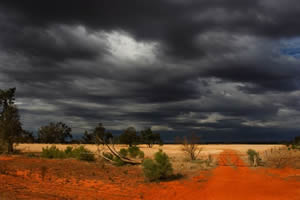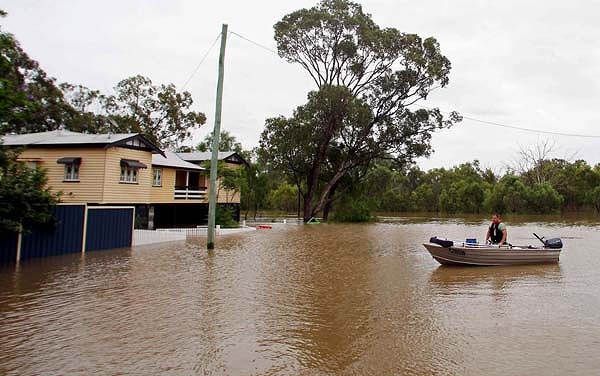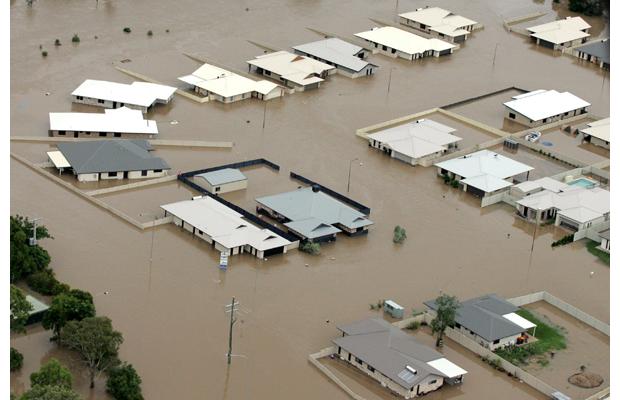 Remember John Howard''s campaign of 'Be Alert Not Alarmed'?
Remember John Howard''s campaign of 'Be Alert Not Alarmed'?
What it tried to do was get people on the lookout for suspicious behaviour and report it, but not to get their knickers in a knot over the endless possibilities of what is going on when they see young men with beards dropping their backpacks and running out an exit of an airport. After all they could just be young private school backpackers returned from their 'year out' traveling through hep' infected Asia and excited to get a hug from their mums. Such was the campaign...look at things and report it to those that can actually make an informed decision and do something about it.
Former US VP Al Gore....was a plain and simple alarmist. He and Bob Brown and Kevin Rudd screamed at us the importance of reining in human induced carbon releases into the atmosphere. Bob Brown wants us to shut down business as we have it, Kevin Rudd wanted us to begin an artificial economy to price carbon (he later back flipped on that as he did on anything that seemed unpopular with his focus groups...).
I do believe humans have a small impact on climate change which in itself is an ongoing thing. As someone who has lived his life relying on the weather and the land, I am all too keenly interested in its changes which directly impact on my livelihood and the species tame, native and feral under my care. However what will occur over the next decade will be a complete crumbling of mass support for the alarmist views of the likes of Al Gore. The problem is the 'Cry Wolf Effect'. That whilst yes the temperatures are rising (they have to we had a mini ice age a thousand years ago) it will be a slow process and will lose popular support because it becomes 'white noise' to voters. But at the same time I think it is more important that we react to it as it happens and be proactive about what is actually under our control, not just focus on the disasters and let them happen.
I didn't want to be a person who received my knowledge third and forth hand, especially after in grade 3 I understood the 'Chinese whisper effect' of handing information on through a line of kids and getting a rather 'different' message at the end of the line. It was about the same time that we were being told that there was an impending Ice Age. Which meant beach front homes would need a car to go surfing thanks to reduced sea levels, disaster for the food bowls of the USSR Canada The US and Europe, which would be lost to very short growing seasons but people didn't get too worried... cause apparently food production would rise in Africa, Asia, Australia and South America and of course those who didn't have beachfront homes would be able to get them and the snobs would be the new westies.
However tell them that coastal areas (where most people live) and tropical islands (where most people want to live) will be lost to rising sea levels and hey presto you have the attention of the population. Problem is if your catastrophic predictions don't come true your populations then start to discount the factual evidence that suggested the changes all along and get numb to the idea that they are contributing to any problem at all.
This is the problems facing governments coming in the future, the drive to clean up our act will wane. This is a bad thing.
Forrest Fires and volcanoes far outweigh human produced atmospheric gas changes. While we can't do much about volcanoes and our abilities to control forest fires once going is limited there is much we can do to reduce the impact of the effects of our climate on us. After all western civilisation has been so successful at that which is why it predominates as the main growing culture on the planet.
Humans on the whole are damn smart animals, exceptionally able to adapt to the world as it changes, but what makes us truly smart is when we realise we do not control nature, this has been lost in my opinion on many of these climate change alarmists.
Humans do not control the climate, just as we do not control the weather. What we do control is its effects on us and how we adapt to minimise that, without adversely creating an even bigger problem.
The climate will always be changing, sure, it stabilises for periods as it makes its slow turns between hot and cold but I know this not because I have been told it but because I have seen it for my own eyes, Roman sea ports in Britain dozens of kilometres from the coast, Former city states now in ruins in the Nazca Desert of Peru, flourishing farmland in the once desolate parts of western China.
Humans can change the way the climate and weather effects us and we have to a large extent, in our past. Here in Australia we now sustain a population of over 20 million well above that of a few hundred thousand only 200 years ago. This is because humans have adapted to ensure we survive the extremes that are inherent in the local climate.
Many of the lessons we learnt have been forgotten. Whist we have succsesfully learned to produce large amounts food from whats was unproductive land we have learned that not all adaptations are successful such as wool growing in Central Australia and intensive soldier settlement farms in the Mallee country. The most important is to learn from each disaster and adapt to the new reality....not harp on about it. I learnt this in so many parts of the globe not just my home land.
 If you get floods build your house on stilts and on high ground. That is one of the reasons our houses in Qld were built on stilts with verandas to keep them cool naturally...and yet recently we have been flooding the landscape with ground level air-conditioned brick homes.....did we not learn?
If you get floods build your house on stilts and on high ground. That is one of the reasons our houses in Qld were built on stilts with verandas to keep them cool naturally...and yet recently we have been flooding the landscape with ground level air-conditioned brick homes.....did we not learn?
Its as though we knew it but have been so preoccupied by this notion of human invincibility that we have forgoton this an other important lessons of adaptability.
If you get fires through, ensure that there is a system of fire breaks about you, high grasses are managed with live stock, your house has an open perimeter free of growth and with an open green lawn (yes thats why Farms have large short lawns around their dwellings...its not a yearning for England as many leftist commentators announce) ensure you have available water to fight fires as they come close.
Minimise waste and consumption. That is of all resources such as electronic climate control (get breezways for summer, shutters for winter and insulation to manage external effects on your home) have a few chooks which consume your organic waste and turn it into protein rich eggs and lawn fertiliser, have your own vege garden which increases green dietary intake utilises waste water and minimises costs on the world wide environment for production.
We must just continue to adapt to our environment as it changes beyond our control and think more about what we each as individuals can do with our homes and our consumption all the while learning as we go rather than talking about the big problem which soon enough people stop listening to, as it becomes someone elses fault.
Not once have I heard anyone on the news channels talk about this mammoth problem of building homes on the ground in flooded areas. Its about time we learnt from our climate and the fact we don't actually control it and get on with adapting to it.


